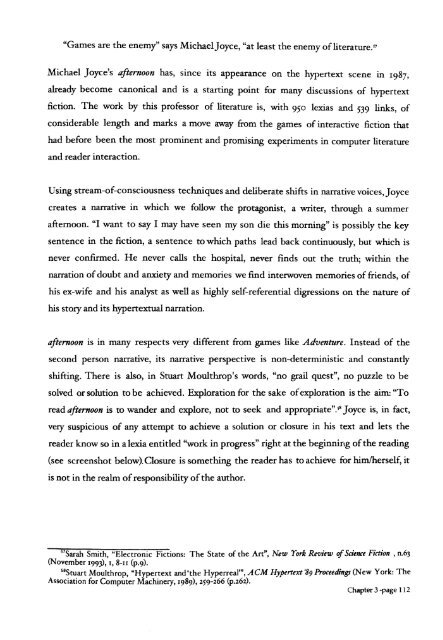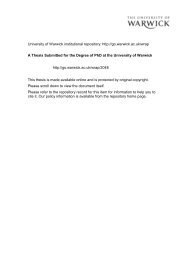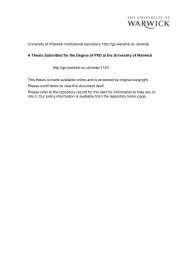From Page to Screen - WRAP: Warwick Research Archive Portal ...
From Page to Screen - WRAP: Warwick Research Archive Portal ...
From Page to Screen - WRAP: Warwick Research Archive Portal ...
You also want an ePaper? Increase the reach of your titles
YUMPU automatically turns print PDFs into web optimized ePapers that Google loves.
"Games are the enemy" says MichaelJoyce, "at least the enemy ofliterature.57<br />
Michael Joyce's afternoon has, since its appearance on the hypertext scene in 1987,<br />
already become canonical and is a starting point for many discussions of hypertext<br />
fiction. The work by this professor of literature is, with 950 lexias and 539 links, of<br />
considerable length and marks a move away from the games of interactive fiction that<br />
had before been the most prominent and promising experiments in computer literature<br />
and reader interaction.<br />
Using stream-of-consciousness techniques and deliberate shifts in narrative voices, Joyce<br />
creates a narrative in which we follow the protagonist, a writer, through a summer<br />
afternoon. "1 want <strong>to</strong> say 1 may have seen my son die this morning" is possibly the key<br />
sentence in the fiction, a sentence <strong>to</strong> which paths lead back continuously, but which is<br />
never confirmed. He never calls the hospital, never finds out the truth; within the<br />
narration ofdoubt and anxiety and memories we find interwoven memories of friends, of<br />
his ex-wife and his analyst as well as highly self-referential digressions on the nature of<br />
his s<strong>to</strong>ry and its hypertextual narration.<br />
afternoon is in many respects very different from games like Adventure. Instead of the<br />
second person narrative, its narrative perspective is non-deterministic and constantly<br />
shifting. There is also, in Stuart Moulthrop's words, "no grail quest", no puzzle <strong>to</strong> be<br />
solved or solution <strong>to</strong> be achieved. Exploration for the sake ofexploration is the aim: "To<br />
read afternoon is <strong>to</strong> wander and explore, not <strong>to</strong> seek and appropriate"."Joyce is, in fact,<br />
very suspicious of any attempt <strong>to</strong> achieve a solution or closure in his text and lets the<br />
reader know so in a lexia entitled ''work in progress" right at the beginning ofthe reading<br />
(see screenshot below). Closure is something the reader has <strong>to</strong> achieve for him/herself, it<br />
is not in the realm ofresponsibility ofthe author.<br />
"Sarah Smith, "Electronic Fictions: The State of the Art", New York Review ofScience Fiction , n.63<br />
(November 1993), I, 8-11 (P.9).<br />
68StuartMoulthrop, "Hypertext and'the Hyperreal'",ACM Hypertext '89 Proceedings (New York: The<br />
Association for Computer Machinery, 1989), 259-266 (p.262).<br />
Chapter 3 -page 112





